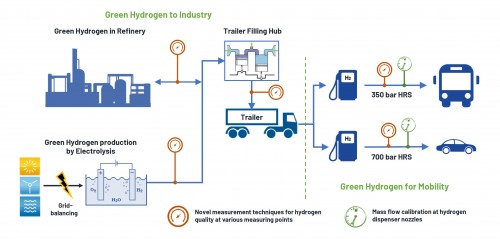The goal of the project is to produce green hydrogen (H2) through electrolysis at industrial scale for use in industry and mobility. It is intended to be used as fuel for public buses in the Vienna region, as well as for industrial use in the H2 hub of the refinery, for uses such as the hydrogenation of CO2 from waste gas flows to produce sustainable fuels.
Supplying the industrial and mobility markets with green H2 is expected to achieve considerable synergies in the efficient utilisation of the necessary investments. Furthermore, the flexibility of the system, which consists of multiple H2 consumers plus a highly responsive H2 production system, should be leveraged to support a cost-optimised electricity (participation in balancing power markets). The construction of a large electrolysis plant of up to 10 MW is planned for this purpose. This is a unique size for Austria that is intended to demonstrate not only lower production costs but also the lowest downtimes and highest plant availability for commercial use in industry and mobility. In addition to the electrolysis system itself, the entire value chain is to be built, including H2 purification, H2 trailer loading, trailer logistics (using 300 bar trailers in Austria for the first time) and a high-availability, energy-optimised bus fuelling station.

The measuring technology developed in the preceding project UpHy I will be tested and optimised under real-world conditions to verify the level of H2 quality required for H2 mobility (as per ISO 14687-2) and calibrated metering at the fuelling station. The insights from the industrial operation and optimisation of the green H2value chain, in combination with the newly developed measuring technology, are the basis for a successful rollout of the efficient use of green H2 in industry and mobility in the future.
In close cooperation between Austria’s leading energy companies, OMV and VERBUND, the planning for implementation of the investments was completed in the project UpHy I. The innovative concepts for the H2logistics were coordinated with qualified partners. HyCentA Research GmbH and VF-Service GmbH developed new high-quality and calibratable metering technology. The Energy Institute at the Johannes Kepler University Linz is analysing how future H2 mobility developments in Austria will effect the economy, society and the environment.
Declarations of intent were signed for the sale of the H2 in the mobility market, although the binding purchase amounts are contingent on receiving the promised subsidies for the bus fleets. Partnering with WIVA P&G has ensured the integration of the project into the Hydrogen Initiative Energy Model Region Austria Power & Gas.